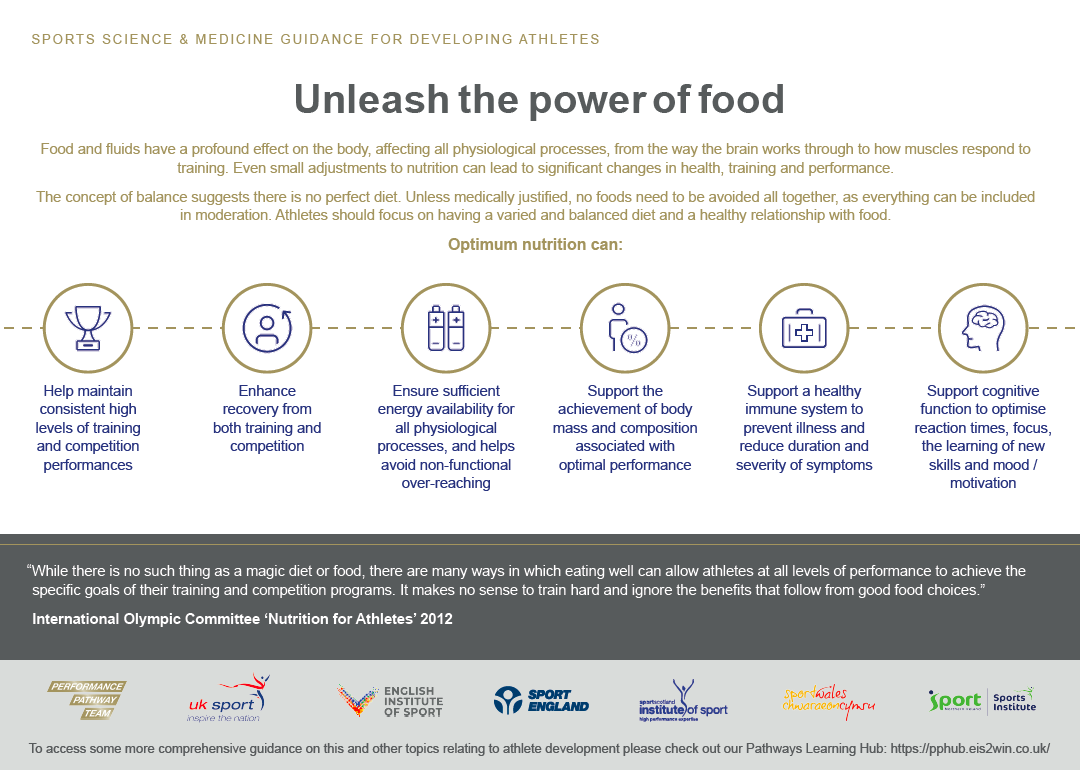The Ultimate Guide To Sports Nutrition
The Ultimate Guide To Sports Nutrition
Blog Article
The Basic Principles Of Sports Nutrition
Table of ContentsSome Of Sports NutritionMore About Sports NutritionThe Facts About Sports Nutrition RevealedGetting The Sports Nutrition To Work
Hydration condition is an essential location of sporting activities nourishment that can make a difference in performance. When involving in sustained high intensity exercise, you need to restore liquids and electrolytes to prevent light to potentially extreme dehydration.Every pound (0.45 kg) shed equals 16 oz (0.5 L) of liquid loss. You need to take in the equal quantity of liquid to rehydrate before the next training session. It's likewise vital to renew electrolytes throughout and after extensive intense exercise to stay clear of dehydration. Since several sports beverages lack sufficient electrolytes, some people choose to make their very own. Additionally, several companies make electrolyte tablet computers that can be integrated with water - Sports Nutrition to give the needed electrolytes to keep you moisturized.
That stated, taking into consideration that athletes typically have greater dietary needs than the basic population, supplements can be utilized to fill in any kind of spaces in the diet. Some individuals pick to include protein powder to their oats to enhance their protein content a bit. Carbohydrate supplements may help endure your energy degrees, especially if you involve in endurance sports lasting longer than 1 hour.
Several long-distance endurance athletes will certainly aim to eat 1 carb energy gel having 25 g of carbs every 3045 minutes throughout a workout session longer than 1 hour. Sports beverages also commonly contain sufficient carbohydrates to keep power levels, however some professional athletes prefer gels to avoid too much liquid consumption during training or events, as this may result in digestive distress.
The Sports Nutrition Ideas
In your body, beta-alanine offers as a building block for carnosine, a compound responsible for helping to lower the acidic setting within functioning muscles during high strength workout. This might help athletes such as brief- to medium-distance runners and swimmers.
Here are 3 of the top sports nourishment misconceptions and what the truths really claim. While protein intake is an important consider getting muscle mass, simply supplementing with healthy protein will not cause any kind of considerable muscle gains. To advertise noteworthy changes in muscular tissue size, you require to regularly do resistance training for a prolonged time period while ensuring your diet plan is on factor.
Another usual myth in sports nourishment is that eating near bedtime will certainly cause added fat gain. This is based on the assumption that due to the fact that you're relaxing, your body is shedding less calories, so any food you eat will great site certainly be stored as fat. While it holds true that your body burns less calories at rest, this does not imply the food will instantly be saved as fat.
Sport nourishment is the branch of and concentrated on people that practice intense or endurance sports. Depending on the last goals of the sport and the training, will certainly emphasise different foods and diet regimens. is necessary because the dietary needs of a professional athlete are different from those called for by a regular person.
Unknown Facts About Sports Nutrition

is among the variables that influence exactly how well an company website athlete carries out, along with their hereditary make-up and the training they do. The foods consisted of in serve three standard purposes: Supplying power Offering matter for strengthening and fixing cells Keeping and managing the metabolic rate There is no solitary for athletes; the relies on the certain demands of each sporting activity and the physique of the athlete.
Mix it up Eat a varied and healthy diet plan that supplies the correct amount of energy and important nutrients. Fuel right Pick a range of food, including foods that include carbs, based on the amount of workout you are doing and vary your consumption appropriately. Strive for five Consume at least 5 portions of fruit and veggies a day; fresh, frozen, dried out and canned all matter.
Protein should preferably be evenly dispersed every three to 4 hours across the day. Researches show that the enhancement of 15-25g of protein to a post-workout dish or snack can enhance glycogen storage, lower muscle mass soreness and advertise muscle repair service. This can be whenever in the 24-hour after your workout, although you might see reduced effects the longer you leave it.
All about Sports Nutrition

Athletes interested in utilizing a supplement must consult an accredited sports dietitian to ensure they make use of the supplements safely and suitably. Training volume and intensity can vary from daily and week-to-week, along with your competitors schedule.

Report this page